In the skincare world, Argan oil is the name you can hardly miss.
With tons of benefits, argan oil is used as a facial oil and is found in other skincare products as well.
Argan oil is plant oil derived from the nuts of the Argan tree found in Morocco and is one of the rarest oils in the world.
But, before using it on your face,
a lot of questions can pop into your mind,
like whether it helps with acne, how to choose a good one, or if there are any side effects to it.
And to solve this problem, I have put down this list of most asked questions about Argan oil for skin and face.
Keep on reading to know all the answers!
But before that let’s see what argan oil contains which makes it so effective for skin and face.
What does Argan Oil contain?
Vitamin A- It encourages healthy skin cell production. Vitamin A also stimulates fibroblasts, the cells responsible for developing tissue that keeps skin firm and healthy.
Vitamin E- It can be beneficial at reducing UV damage to the skin. It increases the levels of the nutrient in the skin tissue and helps to reduce the appearance of scars and dark spots.
Linoleic and Oleic Acids- Argan oil is approximately 80% essential fatty acids, which can be delivered to your skin where they are needed to treat dryness. The primary job of essential fatty acids in the skin is to repair cell membranes, enabling cells to absorb water and the proper nutrition they need for optimal health.
Squalene- It has antioxidant and antibacterial qualities and would help to heal eczema and psoriasis.
Prostaglandins – Prostaglandins are lipid compounds derived from the essential fatty acids in the argan oil. Prostaglandins help to control cell growth and development resulting in healthier, younger looking skin.
Common questions about Argan oil for face and skin
1. Does Argan oil protect from sun damage?
Yes, argan oil protects the skin from sun damage.
The antioxidants in Argan oil, Vitamin E and polyphenols, defend the skin cells from the free radical damages caused by the sun (sunburn, premature aging, and hyperpigmentation).
It provides protection from the damaging ultraviolet rays.
2. Is Argan oil good for irritated skin?
Yes, argan oil is great for irritated skin due to its anti-inflammatory properties.
About 95% of Argan oil consists of two unsaturated fatty acids, oleic acid, and linoleic acid which soothes the irritated skin due to their anti-inflammatory properties.
3. Is Argan oil good for oily and acne-prone skin?
Yes, Argan oil has proven properties to help to deal with acne and oily skin.
Oftentimes, the skin produces more sebum to compensate for the dry, damaged skin barrier due to the overuse of harsh acne ingredients. And this results in breakouts and clogged pores.
The anti-oxidants in Argan oil have the ability to decrease this overproduction of oil by balancing our sebum levels.
Over time, it also fades the stubborn acne scars.
4. Is Argan oil good for wrinkles?
Yes, argan oil is good for wrinkles.
Argan oil has the highest amount of Vitamin E and it is necessary to repair the damaged tissue of the skin and keep it healthy. It absorbs easily and is non-greasy and non-irritating, which makes it a great natural moisturizer. Argan oil is full of antioxidants and fatty acids which help repair skin and remove wrinkles. It is rich in vitamin A, C, and E which exfoliates dead cells and regenerates faster new cells.
A 2015 study shows argan oil benefits also include anti-aging effects. (Source)
This Research states that argan oil reduces inflammation on the skin and moisturizes the skin deeply while improving the elasticity of the skin.
5. Is Argan Oil good for dark spots?
Argan oil reduces melanin production on the face which helps in fading dark spots.
Due to the presence of Vitamin E, Vitamin A (Retinol), and linoleic acid which repair the damaged skin and produce new healthy cells and thus improves the overall look of the skin.
6. Is Argan Oil good for damaged and dry skin?
Yes, argan oil is great for damaged and dry skin.
Argan oil is rich in Omega 6 and Omega 9 fatty acids, essential nutrients that protect your skin against moisture loss. This oil is packed with nutrients to help you ward off dry skin, and enjoy an improved appearance that makes you feel younger too.
Vitamin E is another ingredient of argan oil which is a powerful antioxidant, and it helps skin attract and maintain moisture. It also helps soothe and repair itchy, flaky skin with its restorative property of hydrating skin cells.
7. Is Argan Oil good for dark circles?
Argan oil is effective for dark circles. It exfoliates dead cells and regenerates new cells which lighten the dark circles around the eyes. The vitamin A and E present in the argan oil help to remove fine lines around the eyes.
8. Is Argan Oil good for Psoriasis and Eczema?
The antibacterial and anti-fungicidal properties of argan oil—when combined with vitamin E and antioxidants—can also help speed up the healing process of psoriasis and eczema. The moisturizing property of argan oil keeps skin moisturized and heals the red skin at a faster rate. It calms red, dry, and itchy skin and repairs damaged skin cells.
9. Is Argan oil comedogenic?
Argan oil is non-comedogenic, meaning it won’t clog pores.
In fact, it scores 0 on the comedogenic scale, a medium through which one can determine what facial oils and butters will clog pores and what won’t.
10. Can Argan oil be used as a moisturizer?
Argan oil is well-known to be used as a moisturizer.
With the richness of Vitamin E and essential fatty acids, it helps to lock in the moisture in our skin and provides hydrating effects. This, in return, makes the skin dewy, soft, and supple for a longer period.
Also, it acts as a barrier to prevent moisture loss from our face.
Moreover, any skin type will get the benefit of its moisturizing properties since the oil is suitable for all skin types.
11. How to apply Argan oil on your face?
Take one-two drops of Argan oil as a small quantity does the job and massage it on your skin in small circular motions.
Like most facial oils, apply it at the last step of your nighttime skincare routine and use it before sunscreen and makeup in the morning.
Argan oil is also used in creating DIY skincare recipes.
12. Can I use Argan oil every day?
It is advisable to use it twice a day for better results, once in A.M and once in P.M during your skincare routine.
Using it in the morning will protect your skin from sun damages like hyperpigmentation and sunburn.
And in the nighttime, it helps to repair the skin.
13. Is Argan oil good for sensitive skin?
If you have sensitive skin and are using Argan oil for the first time to your skin, it’s best to introduce the ingredient in your regimen slowly to prevent irritation and inflammation.
Start by using it once every one-two weeks to check if your skin is reacting to it or not.
14. How to choose the best Argan oil?
Due to the rare availability of the oil since its source lies only in Morocco and the expensive oil extraction method, Argan oil is one of the expensive oils in the beauty market.
And this is why this facial oil is high-priced.
Hence, it is always advisable to stick to the high-quality ones and avoid those that are cheap.
Also, look for cold-pressed Argan oils that don’t have ingredients like artificial fragrances, scents, or chemicals.
15. What are the side effects of Argan oil?
Generally, Argan oil is a safe product for most people to use and doesn’t cause side effects.
But to be extra cautious, it’s advisable to do a patch test before starting to use it to see if it causes any skin allergies or triggers acne.
16. Does argan oil expire?
Although pure argan oil has a super long shelf life of two years, they get expired after 2 years.
Keep them under proper storage conditions to prevent the oil from going bad before their expiry date.
17. Why is argan oil so expensive?
The main reason why the cost of pure argan oil is sky-high is due to the process of its production.
The oil is hard to get, and the process it takes is exhaustive, and only people with expertise in this area are eligible for the task as it takes a lot of effort and skill.
Approximately, it takes about 24 hours for one woman to extract one liter of oil from the kernels of the tree.
Moreover, argan oil is native to Morocco, making it one of the rarest oil to find.
Some argan oils are diluted to make it cheaper.
18. Why is argan oil called liquid gold?
Argan oil is often referred to as liquid oil not because they are gold in color, but they are as valuable as gold as they come with tons of benefits for our health.
In fact, the argan tree from where the oil is extracted is also called the ‘tree of life.’
19. Does argan oil clog pores?
Argan oil is one of the finest non-pore-clogging facial oils as they score 0 on the comedogenic rating, which shows to what extent an oil can block or clog your pores.
20. Does argan oil help your eyelashes grow?
Yes, argan oil can be an effective ingredient when trying to promote growth on eyelashes.
It contains all the essential nutrients needed to grow the hairs on your eyelashes.
Use it daily to see visible results.
21. Does argan oil help eyebrows grow?
Argan oil is rich in essential nutrients like Vitamin A, E, and F, responsible for providing hydration to the hair follicles and improving their health. This action stimulates new hair growth.
Thus, use it daily on your eyebrows to promote the growth of its hairs.
22. Can argan oil be used as a carrier oil?
Yes, argan oil can be used as a carrier oil. Moreover, since they are rich in fatty acids and antioxidants, argan oil acts as a great carrier oil.
23. Is argan oil and Moroccan oil the same?
Both the terms argan oil and Moroccan oil are the same and used interchangeably. Since argan oil is native to Morocco, they are also called Moroccan Argan oil.
Yet, Moroccan oil is used mainly for commercial oil which a modified version of argan oil.
24. Does argan oil contain nuts?
Argan oil is extracted from the kernels found in the argan nut of the tree. Hence, it does contain the properties of said nut.
25. Can argan oil be used for skin whitening?
With regular use, argan oil gives brighter and healthier-looking skin.
It is packed with antioxidants like polyphenols and Vitamin E and helps the damaged skin cells caused by UV exposure.
These qualities improve the complexion of the skin, which may look like it has whitened the skin tone.
26. Substitute for argan oil?
Argan oil is an expensive and rare facial oil, so if you are looking for any substitute, Grapeseed oil, Jojoba Oil, and Rosehip seed oil are some great alternatives. They are also packed with anti-inflammatory properties and have many strong antioxidants.
27. Does argan oil help with stretch marks?
As per the results of a study, argan oil can boost collagen, an essential protein required to improve the skin’s elasticity.
Stretch marks can appear when the skin lacks that elasticity.
Hence, argan oil prevents the formation of further stretch marks and reduces the appearance of existing ones.
28. How to store argan oil?
To make argan oil last longer after opening the bottle, it should be kept away from extreme heat; thus, it must be stored away from direct sunlight.
The best way to store argan oil is in a glass container kept in a cool, dry place.
One can also place it in the refrigerator to preserve the oil. It may get solidified, but it will return to normal at room temperature.
How To Buy Argan Oil
It’s always important to make sure you’re buying 100% pure organic argan oil. Careful selection is even more important than usual. Many commercial products are now advertising themselves as “Made with Argan,” and other similar slogans. In fact, these products often have an extremely low percentage of argan oil in them.
Why is this so important? One of the primary reasons for using 100% pure argan oil for face is because it doesn’t come with the same side effects as other chemical-laden products. But unless you’re buying 100% organic and pure argan oil and not “Moroccan oil”, you may find that your product is filled with the very chemicals you sought to avoid.
Commercial Moroccan Oil is a modified version of Argan Oil. Morrocan Oil is a combination of Argan Oil plus other oils and additives so it is not the purest form of Argan Oil.
Don’t run the risk of damaging your skin further with adulterated argan products. Make sure the bottle says 100% argan with nothing else added.
Recipes For Face and Skin using Argan Oil
1. Recipe For Acne
- 1 tablespoon argan oil (Buy From Here)
- 2 tablespoon aloe vera gel (Buy From Here)
- 5-6 drops tea tree essential oil (Buy From Here) (Buy From Here)
Mix all the ingredients in a bowl and store it in a glass container. Keep it away from direct light. Apply it twice a day on a cleansed face. If necessary, you can apply moisturizer.
2. Recipe For Wrinkles
- 2 tablespoon argan oil (Buy From Here)
- 1 tablespoon rosehip oil (Buy From Here)
- 5 drops frankincense essential oil (Buy From Here)
Using a funnel, pour argan and rosehip oil into the bottle and then carefully add frankincense oil into the bottle. Shake well before every use. Apply this argan oil face serum twice every day on a cleansed face. Store it in a dark colored glass dropper bottle and keep it away from direct light.
3. Recipe For Scars and Dark Spots
- 2 tablespoon argan oil (Buy From Here)
- 4 drops lemon essential oil (Buy From Here)
Using a funnel, pour argan oil into the bottle and then carefully add lemon oil into the bottle. Shake well before every use. Apply this argan oil face serum every night on a cleansed face. Store it in a dark colored glass dropper bottle and keep it away from direct light. Do not apply it before going out in the sun and always apply sunscreen during the daytime.
4. Recipe For Damaged and Dry Skin
- 2 tablespoon argan oil (Buy From Here)
- 1 tablespoon avocado oil (Buy From Here)
- 5 drops patchouli essential oil (Buy From Here)
Using a funnel, pour argan and avocado oil into the bottle and then carefully add patchouli oil into the bottle. Shake well before every use. Apply this argan oil face serum twice every day on a cleansed face. Store it in a dark colored glass dropper bottle and keep it away from direct light.
5. Recipe For Oily Skin
- 2 tablespoon argan oil (Buy From Here)
- 4 drops lemongrass essential oil (Buy From Here)
Using a funnel, pour argan oil into the bottle and then carefully add lemongrass oil into the bottle. Shake well before every use. Apply this argan oil face serum daily on a cleansed face. Store it in a dark colored glass dropper bottle and keep it away from direct light.
6. Recipe For Lip Moisturizer
Argan oil also could be used to strengthen the skin area around the lips. It is also used as an edible oil when cooking various dishes. Argan oil could moisturize and soften the lips and keep them from being damaged due to dehydration. There are lipsticks that are specially made with argan oil due to the vast benefits of argan oil on the lips.
Just apply few drops of argan oil to your lips as a lip moisturizer twice a day to keep them moisturized and soft. You can also mix raw honey with argan oil and apply it as a lip mask. Honey is an excellent ingredient to curing dry lips.
7. Recipe For Dark Circles
- 1 tablespoon argan oil (Buy From Here)
- 2 tablespoon aloe vera gel (Buy From Here)
Mix all the ingredients in a bowl and store it in a glass container. Keep it away from direct light. Apply it daily on a cleansed eye area before going to bed. Massage the gel for about 2-3 minutes.
8. Recipe For Bright Skin
- 2 tablespoon argan oil (Buy From Here)
- 1 tablespoon almond oil (Buy From Here)
- 5 drops rose essential oil (Buy From Here)
Using a funnel, pour argan and almond oil into the bottle and then carefully add rose oil into the bottle. Shake well before every use. Apply this argan oil face serum twice daily on a cleansed face. Store it in a dark colored glass dropper bottle and keep it away from direct light.
9. Recipe For Sun Damaged Skin
- 2 tablespoon argan oil (Buy From Here)
- 2 tablespoon aloe vera gel (Buy From Here)
- 5-6 drops peppermint essential oil (Buy From Here)
Mix all the ingredients in a bowl and store it in a glass container. Keep it away from direct light. Apply it daily on the affected area. Massage the gel for about 2-3 minutes.
10. Recipe For Psoriasis and Eczema
- 1 tablespoon argan oil (Buy From Here)
- 3 drops tea tree essential oil (Buy From Here)
Mix both ingredients and apply it on affected area 2-3 times a day. You can also store this mixture in a glass container. Acne scars, eczema, psoriasis, and skin blemishes can be diminished and eliminated with regular use.
11. Recipe For Makeup remover
- few drops argan oil (Buy From Here)
Argan Oil is extremely gentle and does not sting or burn your face like other chemical makeup removers. In fact, it is so tender that it won’t burn your eyes even if it comes into direct contact with them.
To remove makeup with argan oil, simply take a few drops on your hands and apply it all over your face and eyes. Give a gentle massage to all over your face and then take a warm damp cotton cloth and wipe it off.
12. Recipe For Face Moisturizer For All Skin Types
- 1 tablespoon argan oil (Buy From Here)
- 3-4 drops lavender essential oil (Buy From Here)
Using a funnel, pour argan oil into the bottle and then carefully add lavender oil into the bottle. Shake well before every use. Apply this argan oil face serum twice daily on a cleansed face. Store it in a dark colored glass dropper bottle and keep it away from direct light.

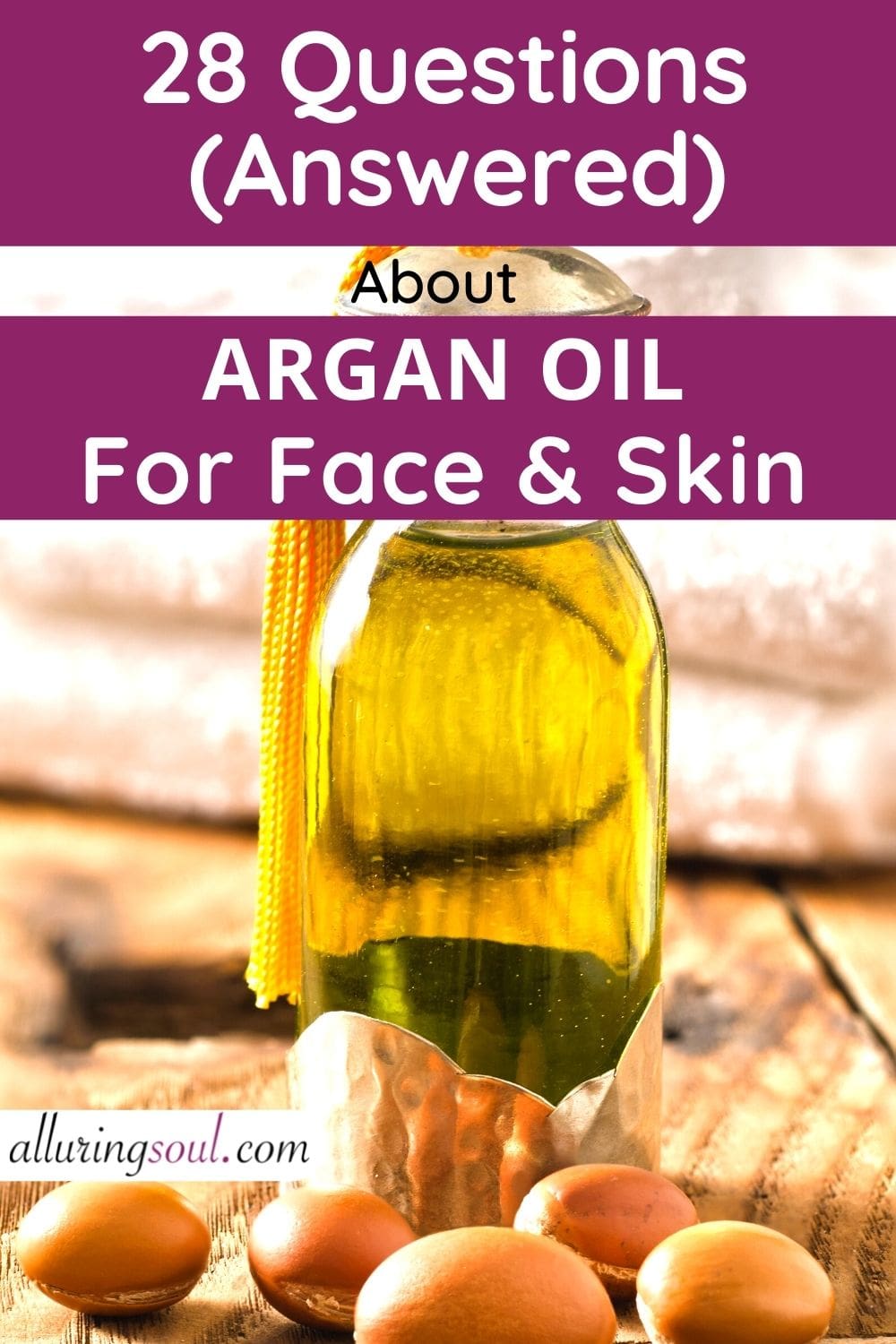

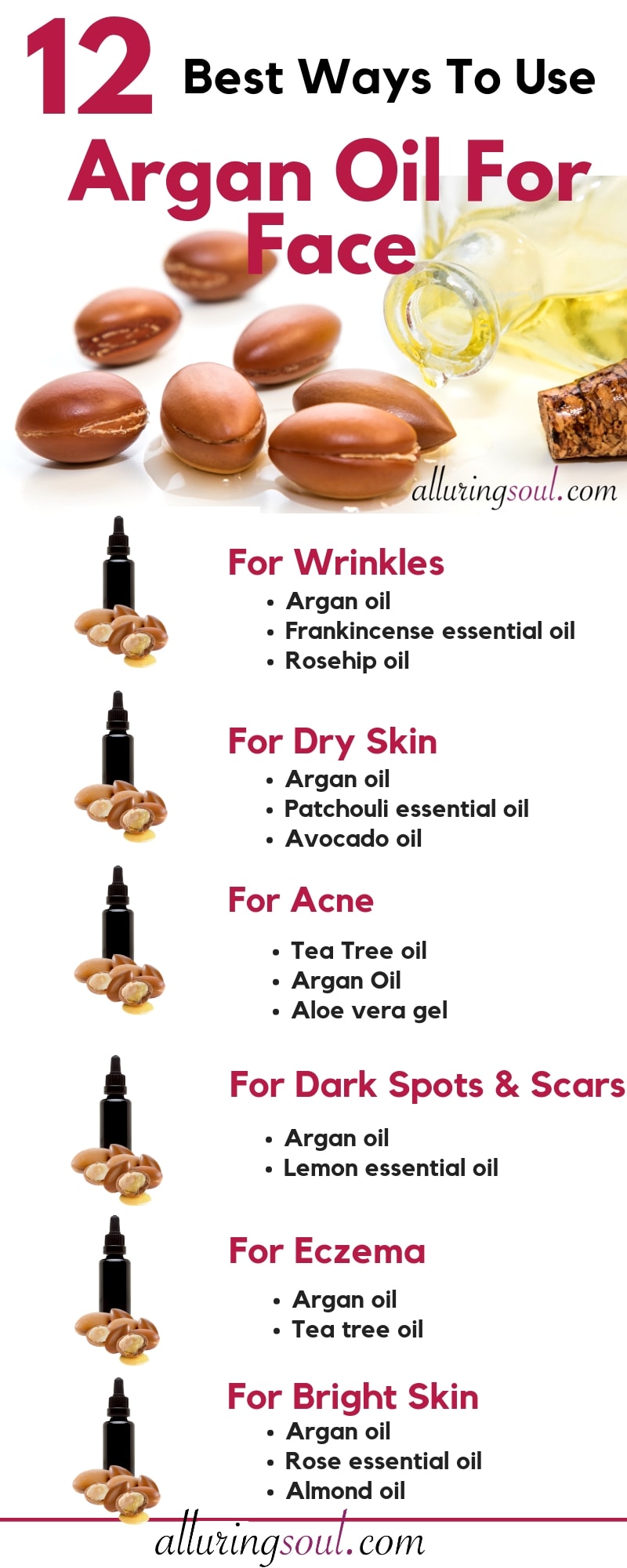
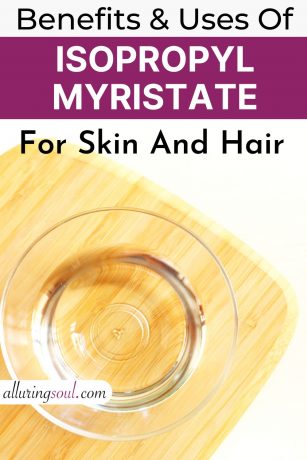
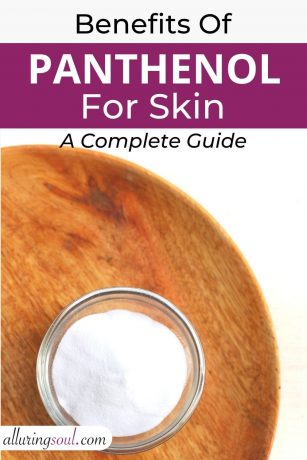
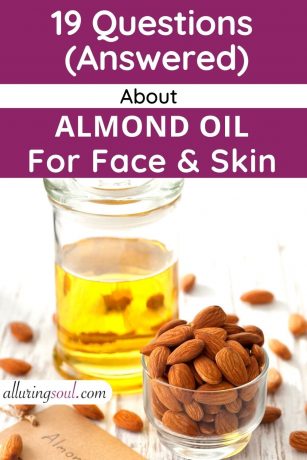
1 Comment
Neha Srivastava
March 3, 2020 at 6:04 pmHi, this is great info on using argan oil. I’m also an avid lover of natural oils for skin and use a blend of various oils. I am in India, which Argan oil brands would you recommend?